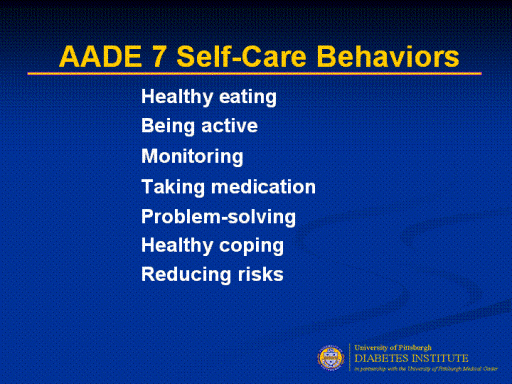| front |1 |2 |3 |4 |5 |6 |7 |8 |9 |10 |11 |12 |13 |14 |15 |16 |17 |18 |19 |20 |21 |22 |23 |24 |25 |26 |27 |28 |29 |30 |31 |32 |33 |34 |35 |36 |37 |38 |39 |40 |41 |42 |43 |44 |45 |46 |47 |48 |49 |50 |review |
 |
Addressing self-management for patients with diabetes
is especially challenging when you consider all of the behaviors
that are integral to diabetes management and self-care.
These are the 7 behavioral targets of self-management
that have been identified by the AADE. These are not only behaviors
to assess and address. They are also the desired outcomes of
diabetes self-management education.
When you look at this list, you realize how complex
and challenging it is for a patient with diabetes to manage their
illness!! And a challenge for us as well!!!!
We also know that following the recommendations for
addressing one of these behaviors is not highly correlated with
following or adopting the other behaviors. For example, we canít
assume that a patient who is taking their medication regularly is
also doing the other things that are important to long-term
management of their diabetes.
As you will see later, assessment of patient
understanding, beliefs and readiness is an important first step
toward providing efficient and effective self-management support.
|